Intro
Discover 5 ways TB lab tests diagnose tuberculosis, including smear microscopy, culture, and molecular tests, for accurate TB detection and treatment, improving public health outcomes.
The importance of tuberculosis (TB) lab tests cannot be overstated, as they play a crucial role in the diagnosis, treatment, and management of this infectious disease. With the global burden of TB being a significant public health concern, accurate and reliable lab tests are essential for healthcare professionals to make informed decisions about patient care. In this article, we will delve into the world of TB lab tests, exploring the different types, their benefits, and the impact they have on patient outcomes.
TB is a bacterial infection that primarily affects the lungs, but it can also affect other parts of the body. The disease is caused by the bacterium Mycobacterium tuberculosis, which is spread through the air when an infected person coughs, sneezes, or talks. TB is a major public health concern, with millions of new cases reported worldwide each year. The disease is curable with antibiotics, but if left untreated, it can be fatal. Therefore, early diagnosis and treatment are critical to preventing the spread of TB and improving patient outcomes.
The diagnosis of TB typically involves a combination of clinical evaluation, imaging studies, and lab tests. Lab tests are essential for confirming the diagnosis of TB, as they can detect the presence of the bacteria in the body. There are several types of TB lab tests, each with its own advantages and disadvantages. In this article, we will explore five ways TB lab tests are used to diagnose and manage TB, including the benefits and limitations of each test.
Introduction to TB Lab Tests
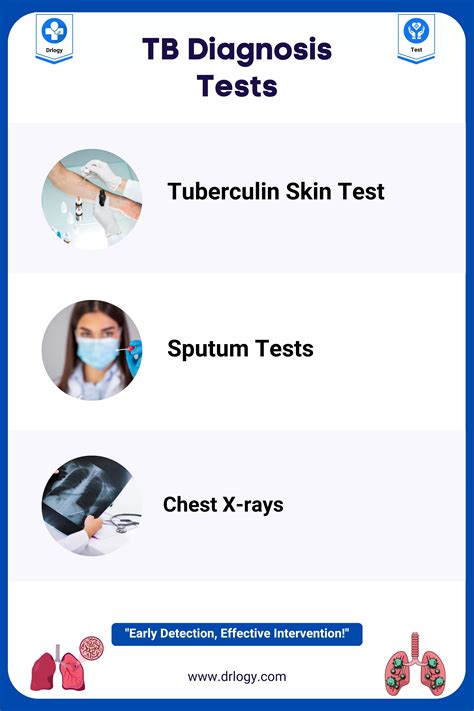
TB lab tests are used to detect the presence of Mycobacterium tuberculosis in the body. These tests can be used to diagnose TB, monitor treatment response, and detect drug resistance. There are several types of TB lab tests, including microscopy, culture, molecular tests, and immunological tests. Each test has its own advantages and disadvantages, and the choice of test depends on the clinical scenario and the resources available.
Types of TB Lab Tests
There are several types of TB lab tests, each with its own strengths and weaknesses. The most common types of TB lab tests include: * Microscopy: This test involves examining a sample of sputum or other bodily fluid under a microscope to detect the presence of Mycobacterium tuberculosis. * Culture: This test involves growing Mycobacterium tuberculosis in a laboratory to detect its presence. * Molecular tests: These tests involve detecting the genetic material of Mycobacterium tuberculosis to diagnose TB. * Immunological tests: These tests involve detecting the immune response to Mycobacterium tuberculosis to diagnose TB.Microscopy-Based TB Lab Tests
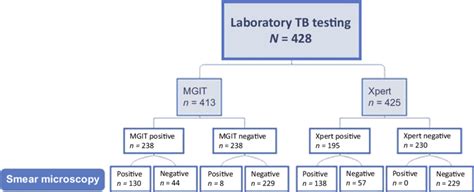
Microscopy-based TB lab tests involve examining a sample of sputum or other bodily fluid under a microscope to detect the presence of Mycobacterium tuberculosis. This test is relatively quick and inexpensive, making it a popular choice in resource-limited settings. However, it has a low sensitivity, meaning that it may not detect all cases of TB. To improve the sensitivity of microscopy-based TB lab tests, fluorescent microscopy can be used. This involves using fluorescent dyes to stain the bacteria, making them easier to detect.
Benefits and Limitations of Microscopy-Based TB Lab Tests
The benefits of microscopy-based TB lab tests include: * Quick results: Microscopy-based TB lab tests can provide results within hours, allowing for rapid diagnosis and treatment. * Inexpensive: Microscopy-based TB lab tests are relatively inexpensive, making them a popular choice in resource-limited settings. * Easy to perform: Microscopy-based TB lab tests are relatively easy to perform, requiring minimal training and equipment.However, there are also some limitations to microscopy-based TB lab tests, including:
- Low sensitivity: Microscopy-based TB lab tests have a low sensitivity, meaning that they may not detect all cases of TB.
- Requires skilled technician: Microscopy-based TB lab tests require a skilled technician to perform the test and interpret the results.
Culture-Based TB Lab Tests
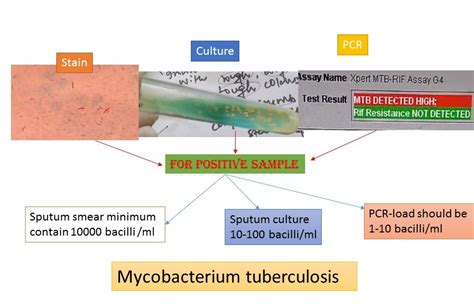
Culture-based TB lab tests involve growing Mycobacterium tuberculosis in a laboratory to detect its presence. This test is considered the gold standard for diagnosing TB, as it is highly sensitive and specific. However, it can take several weeks to obtain results, making it less useful for rapid diagnosis. Culture-based TB lab tests can also be used to detect drug resistance, which is essential for guiding treatment.
Benefits and Limitations of Culture-Based TB Lab Tests
The benefits of culture-based TB lab tests include: * High sensitivity: Culture-based TB lab tests are highly sensitive, meaning that they can detect even small amounts of Mycobacterium tuberculosis. * High specificity: Culture-based TB lab tests are highly specific, meaning that they can distinguish between Mycobacterium tuberculosis and other types of bacteria. * Can detect drug resistance: Culture-based TB lab tests can detect drug resistance, which is essential for guiding treatment.However, there are also some limitations to culture-based TB lab tests, including:
- Slow results: Culture-based TB lab tests can take several weeks to obtain results, making them less useful for rapid diagnosis.
- Requires specialized equipment: Culture-based TB lab tests require specialized equipment and trained personnel, making them less accessible in resource-limited settings.
Molecular-Based TB Lab Tests
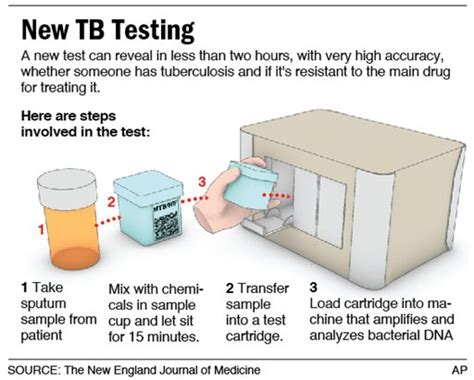
Molecular-based TB lab tests involve detecting the genetic material of Mycobacterium tuberculosis to diagnose TB. These tests are highly sensitive and specific, and can provide results within hours. Molecular-based TB lab tests can also be used to detect drug resistance, which is essential for guiding treatment.
Benefits and Limitations of Molecular-Based TB Lab Tests
The benefits of molecular-based TB lab tests include: * Quick results: Molecular-based TB lab tests can provide results within hours, allowing for rapid diagnosis and treatment. * High sensitivity: Molecular-based TB lab tests are highly sensitive, meaning that they can detect even small amounts of Mycobacterium tuberculosis. * High specificity: Molecular-based TB lab tests are highly specific, meaning that they can distinguish between Mycobacterium tuberculosis and other types of bacteria.However, there are also some limitations to molecular-based TB lab tests, including:
- Expensive: Molecular-based TB lab tests are relatively expensive, making them less accessible in resource-limited settings.
- Requires specialized equipment: Molecular-based TB lab tests require specialized equipment and trained personnel, making them less accessible in resource-limited settings.
Immunological-Based TB Lab Tests
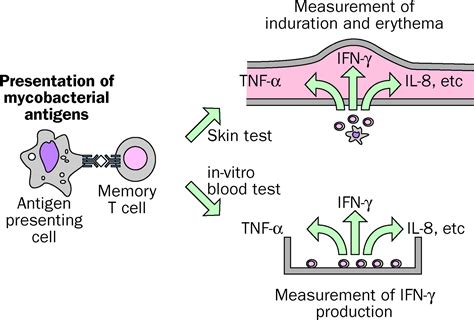
Immunological-based TB lab tests involve detecting the immune response to Mycobacterium tuberculosis to diagnose TB. These tests are relatively quick and inexpensive, making them a popular choice in resource-limited settings. However, they have a low sensitivity, meaning that they may not detect all cases of TB.
Benefits and Limitations of Immunological-Based TB Lab Tests
The benefits of immunological-based TB lab tests include: * Quick results: Immunological-based TB lab tests can provide results within hours, allowing for rapid diagnosis and treatment. * Inexpensive: Immunological-based TB lab tests are relatively inexpensive, making them a popular choice in resource-limited settings. * Easy to perform: Immunological-based TB lab tests are relatively easy to perform, requiring minimal training and equipment.However, there are also some limitations to immunological-based TB lab tests, including:
- Low sensitivity: Immunological-based TB lab tests have a low sensitivity, meaning that they may not detect all cases of TB.
- Requires skilled technician: Immunological-based TB lab tests require a skilled technician to perform the test and interpret the results.
Interferon-Gamma Release Assays (IGRAs)
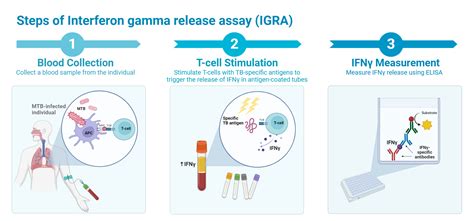
Interferon-gamma release assays (IGRAs) are a type of immunological-based TB lab test that measures the immune response to Mycobacterium tuberculosis. IGRAs are highly sensitive and specific, and can provide results within hours. They are also less affected by previous BCG vaccination, making them a popular choice in areas where BCG vaccination is common.
Benefits and Limitations of IGRAs
The benefits of IGRAs include: * High sensitivity: IGRAs are highly sensitive, meaning that they can detect even small amounts of Mycobacterium tuberculosis. * High specificity: IGRAs are highly specific, meaning that they can distinguish between Mycobacterium tuberculosis and other types of bacteria. * Less affected by previous BCG vaccination: IGRAs are less affected by previous BCG vaccination, making them a popular choice in areas where BCG vaccination is common.However, there are also some limitations to IGRAs, including:
- Expensive: IGRAs are relatively expensive, making them less accessible in resource-limited settings.
- Requires specialized equipment: IGRAs require specialized equipment and trained personnel, making them less accessible in resource-limited settings.
What is the most common type of TB lab test?
+The most common type of TB lab test is microscopy, which involves examining a sample of sputum or other bodily fluid under a microscope to detect the presence of Mycobacterium tuberculosis.
What is the gold standard for diagnosing TB?
+The gold standard for diagnosing TB is culture, which involves growing Mycobacterium tuberculosis in a laboratory to detect its presence.
What is the benefit of using molecular-based TB lab tests?
+The benefit of using molecular-based TB lab tests is that they can provide results within hours, allowing for rapid diagnosis and treatment.
In conclusion, TB lab tests are essential for diagnosing and managing TB. There are several types of TB lab tests, each with its own advantages and disadvantages. By understanding the benefits and limitations of each test, healthcare professionals can make informed decisions about patient care. We encourage readers to share their thoughts and experiences with TB lab tests in the comments section below. If you found this article informative, please share it with others who may benefit from this information. Together, we can work towards improving the diagnosis and treatment of TB, and ultimately reducing the global burden of this disease.
